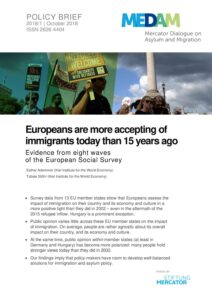Survey data from 13 EU member states show that Europeans assess the impact of immigration on their country and its economy and culture in a more positive light than they did in 2002 – even in the aftermath of the 2015 refugee inflow. Hungary is a prominent exception.
Public opinion varies little across these EU member states on the impact of immigration. On average, people are rather agnostic about its overall impact on their country, and its economy and culture.
At the same time, public opinion within member states (at least in Germany and Hungary) has become more polarized: many people hold stronger views today than they did in 2002.
Our findings imply that policy-makers have room to develop well-balanced solutions for immigration and asylum policy.


